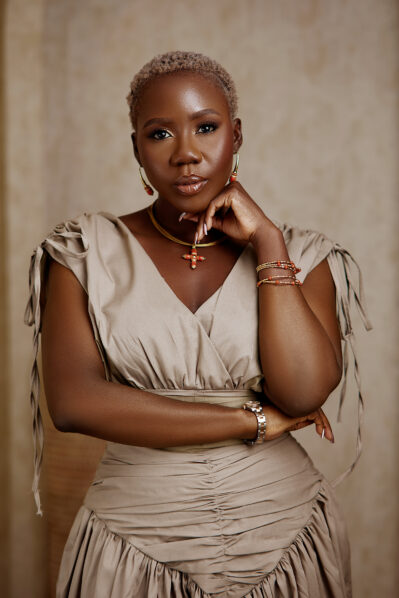 When I first came up with the idea for the #HerMoneyHerPower campaign, I knew it was an important conversation to have. Today, too many women and girls are still being taught that hypergamy is a strategy, and marriage is a financial plan. This, despite the fact that history has shown time and again that one unpredictable life circumstance– like the death of or divorce from a spouse– is all that stands between too many women and poverty. This, despite the examples all around us of women stuck in cycles of abuse because of their financial dependence.
When I first came up with the idea for the #HerMoneyHerPower campaign, I knew it was an important conversation to have. Today, too many women and girls are still being taught that hypergamy is a strategy, and marriage is a financial plan. This, despite the fact that history has shown time and again that one unpredictable life circumstance– like the death of or divorce from a spouse– is all that stands between too many women and poverty. This, despite the examples all around us of women stuck in cycles of abuse because of their financial dependence.
For women, money is both a shield and a weapon. It can be the difference between oppression and freedom. And what both data and lived experiences continue to show is that when a woman has money– the benefits extend to her family, her community and indeed, her country. Women will not achieve gender equality without financial freedom, and Nigeria will not become prosperous until its women have economic power. It really is that simple.
What I didn’t know though when I first began to work on #HerMoneyHerPower– a partnership between my organisation, The She Tank and Bella Naija– was that it would spark a national conversation in Nigeria.
Over the years, I’ve had the privilege of running many campaigns across different continents– most recently, at the Bill and Melinda Gates Foundation where I served as the Deputy Director of Global Content and Campaigns and the Head of Goalkeepers, the foundation’s largest campaign, dedicated to accelerating progress on the Sustainable Development Goals.
Of all the campaigns I’ve worked on, this one has been unique. Our message? It’s time for women to have not just economic empowerment, but power. A woman may have money– but does she have a say in how that money is earned, saved or spent? A woman may have a job– but is she set up to fail due to the disproportionate burden of housework she carries at home or the gendered discrimination she faces in the workplace? A woman may start a business, but can she get business loans in the same way her male peers do?
These are examples of the differences between empowerment and power. When a woman has economic power, she not only has access to money and to the systems that create prosperity (like schools, jobs and capital)– but she has a voice and the ability to make choices within those systems.
What the #HerMoneyHerPower metrics show is that our message was heard. As I write this, the campaign has generated over 1 billion impressions, reaching over 333 million unique users on social media. The campaign has also generated over 250 media mentions and features across traditional and digital media– with an estimated $3.32 million in earned media coverage. The day our task on Big Brother Nigeria aired, #HerMoneyHerPower was the #1 trending topic on X.
Our Ad, starring Funke Akindele, has played over 1,000 times on different TV stations. Our billboards, with our provocative messages, have been placed in eight cities and five languages across the nation. And our 60+ campaign champions– influencers and thought leaders with a collective reach of over 125 million followers– have spread our message from their perspectives on every imaginable platform: television shows, radio stations, newspapers, podcasts, magazines, Instagram, X, Youtube, Snapchat, LinkedIn and more. Many of their posts have gone viral.
What made this campaign truly special though, was hearing back. Uche Pedro (Founder and CEO of Bella Naija) and I have listened closely to audiences throughout this campaign. We heard from thousands of Nigerians who shared their own stories and ideas using our hashtag. Women shared their stories of financial abuse and financial power on their feeds and in our DMs.
One woman began a 30-day #HerMoneyHerPower challenge on TikTok. A group of women in Enugu produced their own #HerMoneyHerPower TV segment, independent of the campaign. We heard from an NGO who took the #HerMoneyHerPower message to a secondary school, and we even heard of the campaign coming up in places of worship.
What’s next? The conversations need to continue– and that starts with you. In partnership with NOI Polls, we surveyed over 3,000 Nigerians and hosted focus group discussions in select states across the country. What was clear from this work is that we still have a long way to go when it comes to mindsets and norms around women and money in Nigeria.
For example, norms around caregiving work in the home (like cooking, cleaning, caring for children and elders), haven’t evolved much– despite the fact that women increasingly work outside the home and are even breadwinners in many homes.
Both men and women still have many negative perceptions–and fears– around women having their money. As our economies and the world continue to change, we need to have conversations about how we can both maintain family values and evolve our gender norms– as individuals, and as a nation.
Omakwu is a Women’s Equality Evangelist, Lawyer and Writer. She is the Founder and CEO of The She Tank.

![Blessing_Omakwu_2[1]](https://guardian.ng/cdn-cgi/image/format=auto,width=600,fit=contain,q=70/https://cdn.guardian.ng/wp-content/uploads/2024/12/Blessing_Omakwu_21-scaled.jpeg)




